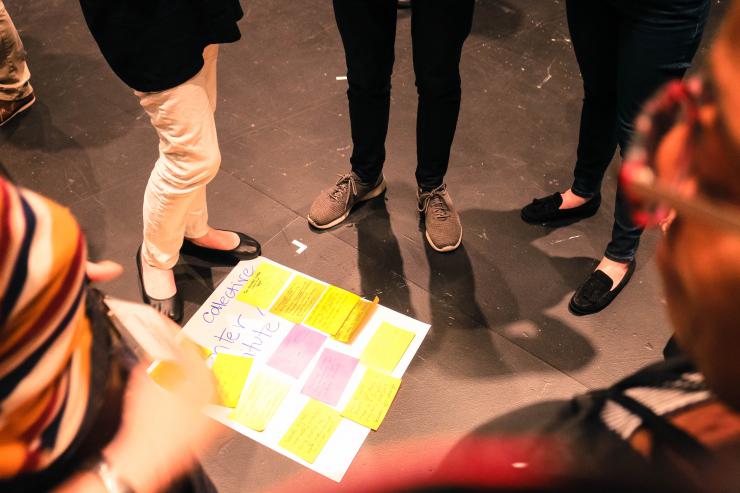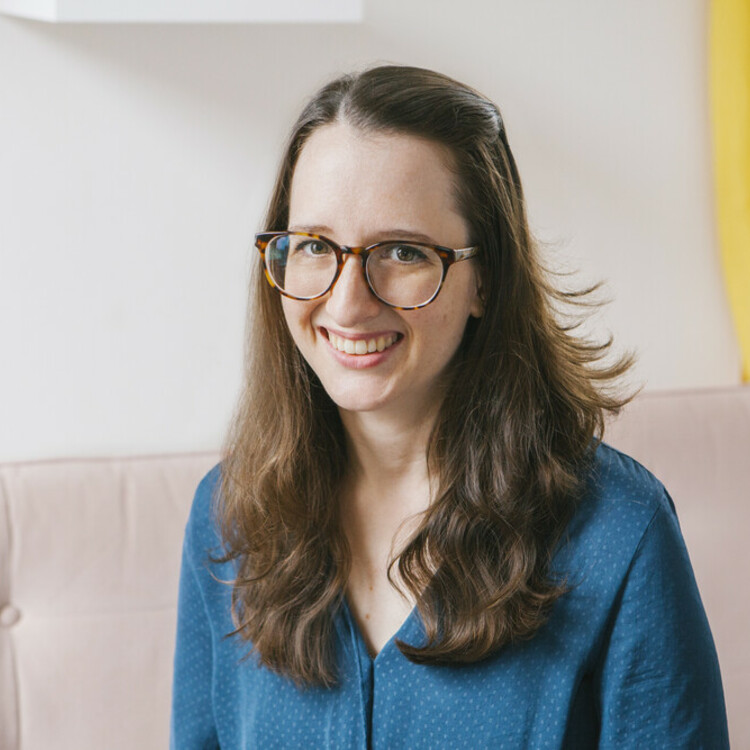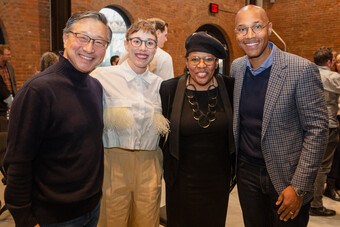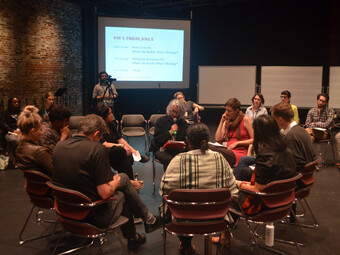How We Produced a Green Convening
In June 2018, HowlRound hosted a Theatre in the Age of Climate Change convening at Emerson College in Boston, MA. This three-day gathering brought together over thirty theatremakers from around the world who are working at the intersection of arts and environmentalism. (If you’re interested in learning more about the conversations, check out the video archive!)
In the interest of living our values, we wanted to make this convening as eco-friendly as possible. But as a famous frog once sang, it’s not easy being green. The following is an honest account of where we succeeded, where we struggled, and what we learned. In sharing this, we hope that we can encourage other producers to consider similar tactics for future events. We also want to hear from you: What have you done? What can we replicate next time?
Food
Since animal agriculture is a major source of greenhouse gas emissions (in addition to other negative environmental impacts), one of our major areas of focus was on what we fed people. At all HowlRound convenings, we always do one dinner out, so for this one, we chose a vegetarian restaurant whose values are aligned with the goals of this convening—their mission is to address global warming by building a better food future. We also had one lunch catered by a vegan restaurant, and another by a certified sustainable business.
A big concern of ours was food waste. The best way to avoid this would have been to order less, but it was hard to balance what the “right” amount of food was. We wanted the participants to feel like they were well taken care of—people are rarely at their most productive or collaborative when they’re hungry—but for certain meals, this led to an excess of food. Luckily, we were able to donate many of the leftovers to a local shelter for people experiencing homelessness.
We also want to hear from you: What have you done? What can we replicate next time?
Waste
In addition to normal trash and recycling bins, our meeting space had multiple compost bins, and we encouraged people to deposit food scraps and paper goods there. We’re lucky to be based at Emerson, which has a robust facilities team, but it was still necessary for us to have a lot of communication around waste management, like what type of bag needed to be in the bins and how to best label them. We learned the hard way that it’s important to do your homework and ask questions, or else efforts can be for naught! Unfortunately some of our compost and recycling actually ended up in the landfill, because the wrong bags were in the bins.
For beverages, we kept jugs of water, coffee, and tea in the room, and we asked people to bring reusable water bottles and coffee thermoses. Many did, and for those who didn’t, we had a few reusable mugs in the room, and some disposable cups. The lunch caterers also brought bottled beverages. In the future, we’d like to provide more reusable mugs and glasses, and hopefully eliminate the need for bottled beverages and disposable cups all together.
We’re also hoping to be able to provide reusable cutlery for upcoming convenings. We had compostable spoons, forks, and knives for some meals, but ran out for others and had to use plastic. However, we learned that most items labeled compostable (cups and cutlery, for instance) actually aren’t compostable at 90 percent of composting sites, and end up in landfills just like plastic. So reusable really is the ideal. Of course, reusable dishes and silverware need to be washed, so that’s another factor we’ll have to figure out in the future in terms of time, labor, and money.
Packaging is also always a huge consideration when feeding a large group of people, so for this convening we didn’t offer any individual lunch boxes, only platters of sandwiches and large bags of popcorn and chips for snacks (rather than individual bags), which were served in bowls. For breakfasts, we provided platters of baked goods and a large bowl of yogurt and granola, rather than individually wrapped items. Some of our caterers were even able to provide reusable platters which they picked up the next day, saving more plastic from the landfill.
Supplies
We did our best to minimize printed materials, relying instead on emailing out packets of information and making Wi-Fi available in the space. The convening wasn’t zero-waste in this way, however: we did provide single-page printed agendas for those who wanted them, and used large pieces of paper for note-taking during group brainstorms (though we utilized a large whiteboard as well). This is certainly an area ripe for further exploration in the future—what would it take to have a paper-free gathering?

Travel
With participants coming into Boston from around the world, the question of how to handle travel was a complicated one, and something we talked about a lot. Obviously flying anywhere involves major carbon emissions. Ultimately, though, we believe that since climate change is a global issue, conversations about it cannot happen productively without including voices from the around the world. We also believe that the alchemy that happens when people are sharing the same physical space simply cannot be replicated through digital technology (it’s why we work in theatre, after all).
Knowing all this, we did what we could to mitigate the issue: we made sure that all official convening activities and locations (hotel, meeting space, and dinner) were within walking distance from each other. Many people did still take cars to and from the airport, and we could have been better at either incentivizing public transportation or taking a stronger hand in arranging carpools for folks with similar flight times.
A few days before the convening, we learned about carbonfund.org, and via their services we were able to offset the carbon emissions of the whole convening for just a few hundred dollars.
Moving into the Future
Throughout the producing process, we put extra effort towards the sustainability of the convening because of the subject matter, but perhaps the main lesson we learned is that it wouldn’t be that hard to make these choices standard practice. It certainly required extra planning and coordination, but overall the budget wasn’t impacted because of the choices we made—certain things cost more, others cost less. The real impact was in the time it took to think critically about how we had done things in the past and if and how we should do them differently. It was so worth it, and now we can strongly say that eco-consciousness isn’t just for talking about eco-theatre: it should be at the core of everything we do.
Please chime in with your tips and learnings in the comments below—we will be grateful to utilize them in our future work, and would love for this page to be a resource for others.








Comments
The article is just the start of the conversation—we want to know what you think about this subject, too! HowlRound is a space for knowledge-sharing, and we welcome spirited, thoughtful, and on-topic dialogue. Find our full comments policy here
Thank you so much for your thoughtfulness with this convening and for sharing your learning. This is all very helpful.
In regards to paper consumption-- I know it doesn't carry the same benefits as reducing use of paper, but something the WordBRIDGE Playwrights' Laboratory used to do was to plant trees to help offset the use of paper. I believe they did this through the Arbor Day Foundation.
Thanks so much for reading and for your thoughts, Greg! I love the idea of having trees planted to offset paper consumption—I'll definitely check out that foundation. I also work in new play development, and I think a lot about how much paper we go through in those processes. It would be awesome if this could be standard practice.
You might find this Irish groups approach interesting https://www.theatreforum.ie...
This is awesome, thanks, Pamela! I love how the handle conference badges, especially—definitely going to think about stealing that one.